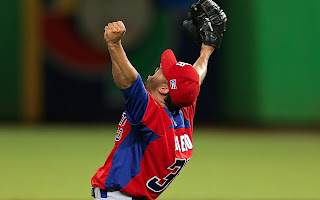 |
| Puerto Rico defeats the USA (Getty Images) |
While Dennis Rodman paraded his feather-dusted brain around North Korea and The Holy See, there was actually a much more productive style of diplomacy playing out on the diamond. The people behind the World Baseball Classic were busy fighting an uphill battle, not one that could be compared to the world of military manuevers nor of espionage. Rather, the organizers of the World Baseball Classic were fighting a hand-to-hand combative battle for relevancy and public awareness.
Staging the World Baseball Classic in March is much like the challenge we (at the NBA) took on in the late 1980s, when we began the McDonald's Open. Together with our friends at FIBA (the International Basketball Federation for the IOC), the NBA powers that be met with Alexander Gomelski, the great coach of the former U.S.S.R sports commission, who had plans to test his boys against the very best in the word instead of some 5-for-10 point point guard from Bloomington, Indiana. Gomelski had been a frequent guest of the USA via nearly annual tours to have his Russian National Team play against the likes of Bobby Knight's Indiana Hoosiers during the lead-up to the NCAA regular season. And, of course, according to Knight and the NCAA, that was all quite nice and wonderful.
That was until the NBA got involved.
Then, Knight and his NABC buddy, John Thompson of Georgetown, then the head coach of the 1988 USA National team was preparing to play in the '88 Summer Games in Seoul, Korea. Big John (Sr.) stepped up to any available pulpit to scream bloody murder, as the NBA was big, bad and evil because it was about to embark on a path that would literally provide the hated Soviet team with the very tools to defeat the USA (sound familiar?).
"The NBA has been very helpful to our opponents," said Thompson, he the creator of Hoya-Paranoia. "Presently, they are training the Soviet team," he noted on an NBC Today Show appearance in the summer of 1987. The hypocrisy was hysterical as Thompson very conveniently ignored the fact he and his NCAA colleagues had staged a 26-day, 14-game tour for the Soviet National team to play against the very best collegiate teams as early as the summer of 1975, the year before the 1976 Olympics or a Baker's Dozen years before Thompson was to take on the USSR in 1988. It was disturbing to see the self-serving tactics taken by a so-called educator of young men at an institution such as Georgetown, but the fact of matter remains, the individual agendas of many a sportsmen tends to hold back the bigger picture of globalization in the world of sport.
Call it what you may, but Major League Baseball is working to create a stronger world infrastructure for its game and the vehicle is the World Baseball Classic, a tournament born in 2006 to combat the IOC banishment of Baseball from the Olympic Games.
Of course, the USA is not exactly a national team-loving country of sports fans. The American fans prefer their sports professional or collegiate and they rarely, if ever, pay much attention to the many national team competitions in true world sports such as soccer (football to most) or basketball, never mind baseball, track & field, gymnastics, ice hockey or curling. Americans like their national teams served up as little pixies on a podium, coming complete with Olympic gold medals already attached to their warm-ups. Americans like the underdog, not the favorite. while they want their national teams to win, they don't care to watch them do so unless there is an underdog storyline, much like the Mike Eruzione-led 1980 USA Miracle on Ice team.
So, the success of a world tournament being gauged or judged by acceptance of the American television audience or the amount of column inches granted by old-school American sports editors is an unrealistic goal or an uphill struggle, at best. When the USA, led by the likes of Derek Jeter, fell to its global opponents, like 2006 and 2008 World Baseball champion Japan, the average American tuned out of the WBC and tuned-into March Madness.
The same scene is playing out right now, as the USA fell to both the Dominican Republic (3-1) and Puerto Rico (4-3) and is now on the outside, looking in to a semi-final round that will include Japan, the Netherlands, and the Latin power-brokers from San Juan and the DR.
The programmers at ESPN HQ in Bristol had the BIG EAST on ESPN and the Big Ten on ESPN2, so the WBC was relegated to ESPN Deportes and the fan base from the islands cheered on their squads with a much stronger national patriotism than can be found amongst American fans. Thus, the large Latin-partisan crowds in Miami, Phoenix and all points East have been strong. The strength of the WBC is a Spanish-speaking sportsman, enthused to a point to properly illustrate the sheer definition of enthusiastic in the Apple thesaurus says, "Enthusiastic, adjective; "An enthusiastic supporter of Latin American baseball."
Ladies and Gentlemen, I give you the World Baseball Classic. If you're tired of listening to Dick Vitale, Bobby Knight, and you don't care to watch college basketball and its money-grubbing, greedy conferences destroy each other, you might look into a semi-final matchup being staged in a multicultural wonder town known as San Francisco. That tournament features the four very best baseball teams in the world. None of them are American.
No comments:
Post a Comment